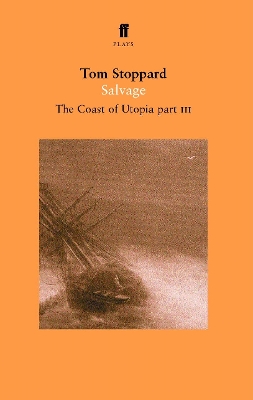Tom Stoppard
4 total works
It is 1936 and A. E. Housman is being ferried across the Styx, glad to be dead at last. His memories, however, are dramatically if confusedly alive. The river which flows through Tom Stoppard's play connects Hades with the Oxford of Housman's early manhood where High Victorianism in art, literature and morality is being challenged by the Aesthetic movement and an Irish student called Wilde is preparing to burst on to the London scene...
The Invention of Love premiered at the National Theatre, London, in September 1997.
The Invention of Love premiered at the National Theatre, London, in September 1997.
Voyage is the first part of Tom Stoppard's trilogy The Coast of Utopia, an epic but also intimate drama of romantics and revolutionaries in an age of emperors.
Beginning in 1833, Voyage takes up the story of the future anarchist Michael Bakunin when his stage was still Premukhino, the Bakunin family estate, and Moscow under the repressive rule of Tsar Nicolas I, and when Michael and his four sisters, like many upper-class Russians of their generation, were in the thrall of German idealistic philosophy. 'I knew there were families,' remarks his friend, the brilliant young critic Vissarion Belinsky. 'I come from a family. But I had no idea.' But family life, with its passionate ties and conflagrations, all in the cause of exalted love and idealism, is left behind for ever when Michael at the age of twenty-six sets sail for Germany, waved goodbye by his newest friend, the first self-proclaimed socialist in Russian history, Alexander Herzen: the move from pure thought to revolutionary action is on the horizon.
Beginning in 1833, Voyage takes up the story of the future anarchist Michael Bakunin when his stage was still Premukhino, the Bakunin family estate, and Moscow under the repressive rule of Tsar Nicolas I, and when Michael and his four sisters, like many upper-class Russians of their generation, were in the thrall of German idealistic philosophy. 'I knew there were families,' remarks his friend, the brilliant young critic Vissarion Belinsky. 'I come from a family. But I had no idea.' But family life, with its passionate ties and conflagrations, all in the cause of exalted love and idealism, is left behind for ever when Michael at the age of twenty-six sets sail for Germany, waved goodbye by his newest friend, the first self-proclaimed socialist in Russian history, Alexander Herzen: the move from pure thought to revolutionary action is on the horizon.
Shipwreck is the second part of Tom Stoppard's trilogy The Coast of Utopia. It continues the story of the anarchist Michael Bakunin, the critic Vissarion Belinsky, the writer Ivan Turgenev, and their circle, but as the action shifts from Russia to Paris in the year of European revolution, it is Alexander Herzen and his wife Natalie who come to occupy the focus. Isaiah Berlin called Herzen a writer and thinker of genius, one of the greatest of nineteenth-century Russians; and it was here, in the intoxicating anticipation and the dashed hopes of the 1848 revolution - when the loss of his political illusions were overshadowed by a series of personal calamities - that Herzen found his greatness, seeking the way forward for Russia, the just society and the good life.
Salvage is the final part of Tom Stoppard's trilogy The Coast of Utopia. It is 1852. Alexander Herzen, who left Russia five years earlier, has arrived in London in retreat from a series of public and private calamities. Revolution in Europe has hit the rocks. 'I have lost every illusion dear to me,' he says. 'I'm forty. The world will hear no more of me.' But émigré circles in London (including Karl Marx) are buzzing with plots and intrigues, and Herzen's money, as well as his sardonic wit, soon have an outlet among them. With the accession of Alexander II, 'the Reforming Tsar', Herzen's revived spirits are boosted by the arrival of his childhood friend Nicholas Ogarev with his wife Natalie. Their journal 'The Bell', smuggled into Russia, enters its heyday in the struggle for the emancipation of the serfs. Will it be reform from above or revolution from below? At home the 'new men' who once looked on Herzen as their inspiration are in a hurry, and in London he is once more at odds with Michael Bakunin, who has escaped from exile in Siberia. Meanwhile Natalie Ogarev finds in him her romantic ideal, and Herzen's public and private travails are far from over.

